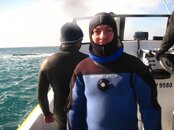I'm just back from a 3 days dives in cold waters (8 ° C - 46 ° F). I did a 6 dives and this total 11 dives with drysuit in my hole diving history (71 logged dives).
The weather was also cold with something like 5 to 10 ° C (41 to 50 ° F) in the boat. 2 days were cloudy and one sunny.
I worn a rented neoprene drysuit manufactured by PINO SUB here in Argentina. The neoprene thickness was 6 mm. The drysuit valves were SI TECH from sweden (SI TECH AB).
The drysuit was not new though it was in very good shape.
I worn also 5 mm wet gloves and 5 mm semi-dry hood.
I realize that I was not wearing the correct undergarments, as I was pretty cold at the end of the second dive every day.
I've noticed that when I d-off the drysuit after the second dive, I had several wet patches in my undergarments just where the inflator valve is located in my chest and also several wet patches in both shoulders, this is why I cannot blame the exhaust valve in my left shoulder.
Besides, my both wrists were wet, very little.
I understand also that though I was conscious that I should not move my neck so much, I did, this possible causing the wet shoulders. What I'm concerned is related to the wet chest.
Is all this normal with those using drysuits ?

The weather was also cold with something like 5 to 10 ° C (41 to 50 ° F) in the boat. 2 days were cloudy and one sunny.
I worn a rented neoprene drysuit manufactured by PINO SUB here in Argentina. The neoprene thickness was 6 mm. The drysuit valves were SI TECH from sweden (SI TECH AB).
The drysuit was not new though it was in very good shape.
I worn also 5 mm wet gloves and 5 mm semi-dry hood.
I realize that I was not wearing the correct undergarments, as I was pretty cold at the end of the second dive every day.
I've noticed that when I d-off the drysuit after the second dive, I had several wet patches in my undergarments just where the inflator valve is located in my chest and also several wet patches in both shoulders, this is why I cannot blame the exhaust valve in my left shoulder.
Besides, my both wrists were wet, very little.
I understand also that though I was conscious that I should not move my neck so much, I did, this possible causing the wet shoulders. What I'm concerned is related to the wet chest.
Is all this normal with those using drysuits ?






